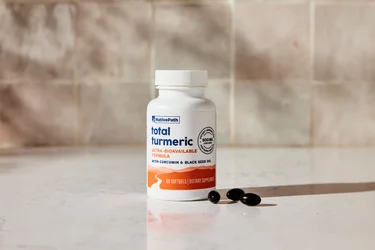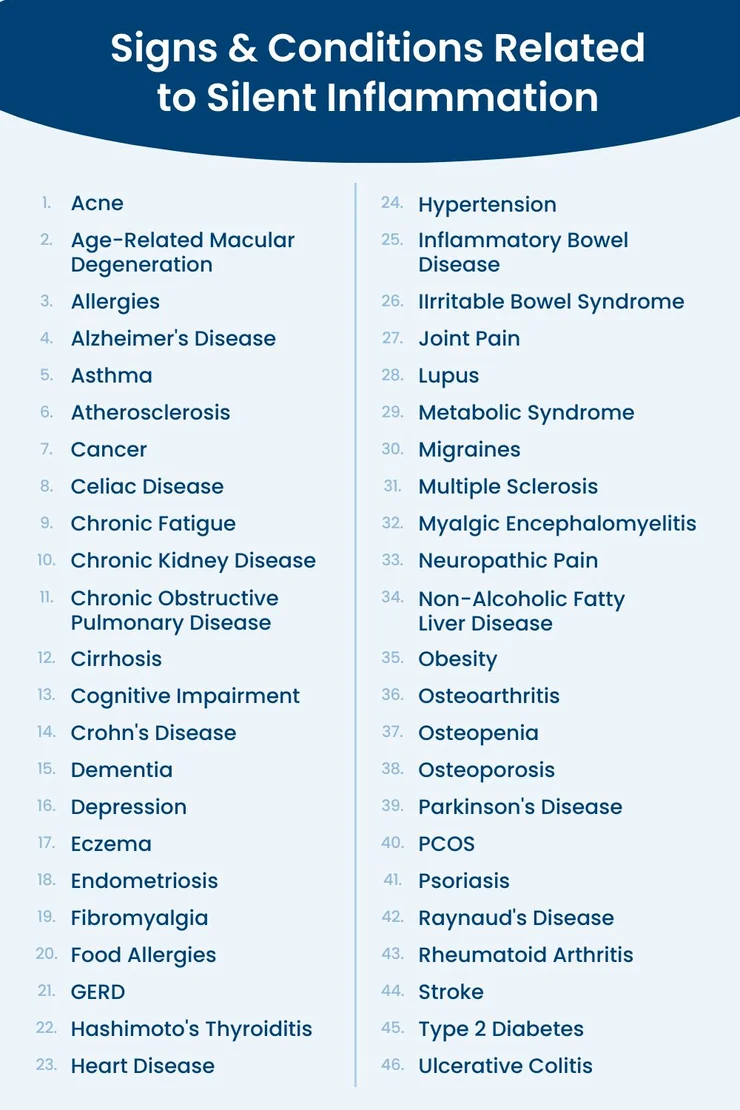Health
Silent Inflammation: What It Is, How to Measure It, & the Conditions It May Cause
October 4, 2023
Read on to find out more about silent inflammation and learn how you can prevent it.
What Does “Silent Inflammation” Mean?
Most of us are very familiar with the acute inflammation that can happen alongside an injury or minor infection like the common cold. Yet, beneath the surface lurks a more harmful type of inflammation—one that can go undetected for years.
Silent inflammation—also known as chronic low-grade inflammation or systemic inflammation—quietly and discreetly wreaks havoc on our bodies. In other words, this type of inflammation happens just below the pain threshold. This means it can cause harm for long durations, unbeknownst to the individual.
While silent inflammation isn’t a disease by any means, it can lead to markers that eventually cause debilitating and life-threatening illnesses. Generally, “silent” often means there aren’t any symptoms until illness strikes. This means you won’t have any noticeable pain, redness, swelling, loss of function, or a fever.
However, silent inflammation may lead to increased sickness, which may be the first sign that something is amidst.

Fight Inflammation Naturally
Our unique formula combines Full-Spectrum Curcumin with Black Seed Oil to protect against oxidative stress, reduce inflammation & support your immune system.
How Can You Measure Chronic Inflammation in the Body?
Silent inflammation is a type of chronic inflammation—but with zero symptoms. Yet, usually, there are various inflammatory markers that indicate things are going awry (1).
Two of the most common markers used include:
- C-Reactive Protein (CRP): This is a protein produced by the liver. Its levels rise in response to inflammation (2).
- Interleukin-6 (IL-6): This is a cytokine, a type of immune cell, produced at the site of inflammation (3).
Both of these markers can be tested via a blood test at your doctor’s office.
In addition to the above, your doctor may also perform the erythrocyte sedimentation rate (sed rate or ESR) test. This looks at the protein density of red blood cells, which can indicate inflammation (4).
A surprising three out of five people worldwide die due to diseases or illnesses linked to chronic inflammation (5).
“Chronic inflammation is tough on the body and can damage joints, internal organs, tissue, and cells,” says Dr. Keenan A. Walker, a distinguished scholar at the National Institute on Aging (NIA). “It can also lead to heart disease, stroke, and cancer.”
Other common inflammatory diseases include:
- Diabetes
- Rheumatoid arthritis
- Allergies
- Chronic obstructive pulmonary disease (COPD)
- Autoimmune diseases
So, how does inflammation lead to the diseases listed above? Well, inflammation causes damage to the cells of the body, leads to mutations, or even cell death (6). In turn, this causes various dysfunctions and problems for long-term health. In short, the cells of the body are unable to perform their jobs effectively.
Silent inflammation can manifest as the following signs and conditions…

What Causes Silent Inflammation?
There are several factors that can contribute to chronic, low-grade inflammation in the body (5). These include the following:
- Aging: With age comes an elevation of inflammatory molecules in the body. It’s thought this happens due to mitochondrial dysfunction (the powerhouses of our cells) or free radical accumulation, which causes damage to our bodies’ cells.
- Obesity: Our society is more sedentary than ever before, and this means our general population is becoming more and more overweight. Many health experts consider fat tissue an endocrine organ, meaning it can secrete inflammatory compounds. In fact, metabolic syndrome is often caused by obesity and these mechanisms.
- Poor Diet Choices: Our diet lays the foundation of our health. But eating a diet high in saturated fats, trans-fats, and refined sugars can increase inflammation within the body. We’ll discuss more on how diet impacts inflammation below.
- Smoking: As you might already know, smoking cigarettes is associated with chronic inflammation and may lead to lung cancer or other diseases down the line.
- High Stress: Physical and emotional stress have both been associated with low-level inflammation.
- Lack of Sleep: Those with irregular sleep schedules or sleep disorders are more likely to experience low-level and chronic inflammation. This is often due to the amount of stress these can place on the body and its regular functioning.

Fight Inflammation Naturally
Our unique formula combines Full-Spectrum Curcumin with Black Seed Oil to protect against oxidative stress, reduce inflammation & support your immune system.
How Diet & Nutrition Impact Inflammation
You might have heard talk about “anti-inflammatory diets”—and it’s not all just talk. What we eat impacts the levels of inflammation within the body (7).
In fact, inflammation usually arises due to excess oxidative stress or impaired glucose or fat metabolism. However, we can reduce oxidative stress by consuming antioxidant-rich foods like berries, oranges, papayas, figs, mangos, tomatoes, and cherries. Antioxidants help combat free radicals, preventing cellular damage.
On top of this, experts recommend consuming 80-90% whole foods. This means reducing refined sugars and processed foods in your diet (two things that contribute to increased, low-level inflammation).
How Gut Health Can Impact Inflammation
Your diet directly impacts your gut health. And your gut health plays a major role in managing inflammation.
Within the gut, you have a delicate balance of trillions of good and bad bacteria. When this bacteria becomes imbalanced, conditions like a “leaky gut” can arise. When a gut is leaky, it becomes more porous than it should be. This allows harmful bacteria and toxins to enter the bloodstream, triggering an immune response that can result in low-grade inflammation. And as you already know, consistent low-grade inflammation is what can lead to more serious health issues like metabolic disorders, autoimmune diseases, and even neurological issues (8).
That said, nurturing your gut with whole foods, a high-quality probiotic, and prebiotics can go a long way in preventing silent inflammation.
How Aging Can Impact Inflammation
Dubbed “inflammaging,” various research links chronic and silent inflammation with accelerated aging (9). Thus, if we want to age gracefully and live longer, we want to focus on keeping our inflammation in check, even the undetected types.
The truth is that we will all face varying degrees of inflammation over the course of our lives. And it’s not all bad. In the short term, inflammation is part of your body’s natural immune response, such as immediately after an injury or at the onset of an infection. It helps the body defend itself against foreign entities, such as germs, bacteria, and viruses.
In other words, inflammation is necessary—to some degree. But we never want it to last long-term or slowly lurk beneath the surface for months or years, like silent inflammation. This is where our health is put in jeopardy and where inflammation can hold us back from living our best and healthiest lives.

Fight Inflammation Naturally
Our unique formula combines Full-Spectrum Curcumin with Black Seed Oil to protect against oxidative stress, reduce inflammation & support your immune system.
Krista Bugden
Krista Bugden
Medical Disclaimer
This content is for informational and educational purposes only. It is not intended to provide medical advice or to take the place of such advice or treatment from a personal physician. All readers/viewers of this content are advised to consult their doctors or qualified health professionals regarding specific health questions. Neither Dr. Chad Walding nor the publisher of this content takes responsibility for possible health consequences of any person or persons reading or following the information in this educational content. All viewers of this content, especially those taking prescription or over-the-counter medications, should consult their physicians before beginning any nutrition, supplement, or lifestyle program.



